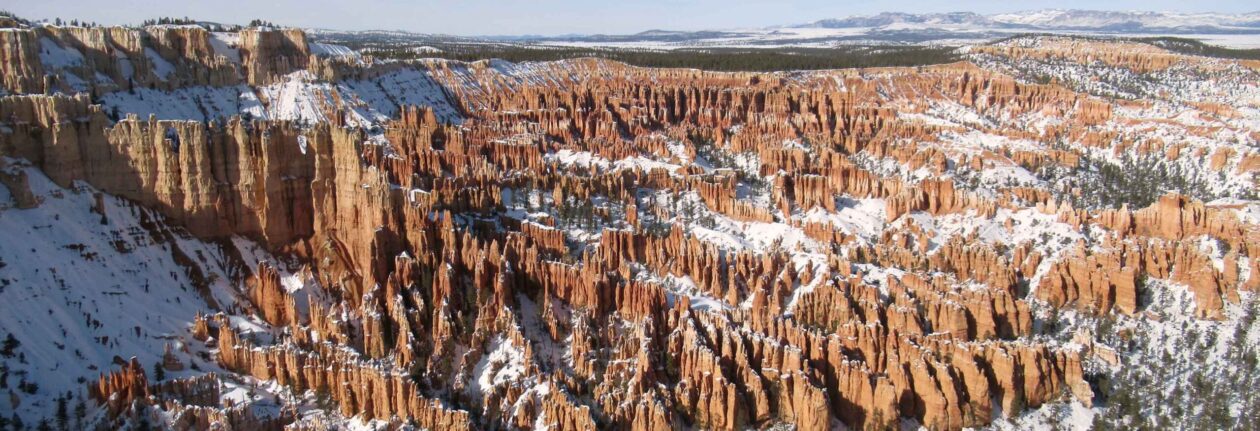Guilin, China
Got up today and took a shower in the combined toilet-and-shower room (just like the one at the hostel I stayed at in Seoul, although at least this time the toilet floor was elevated above the “shower” floor – a curtain would at least help to keep water off the toilet). I then caught the tour bus to Yangdi Pier; the plan today was to take a bamboo raft down the Li River to view all the impressive mountains along the river. We headed south from Guilin and stopped at a cultural heritage museum and shop. The native peoples here demonstrated making metal bracelets, played a ballad on stringed instruments very much like guitars, and then tried to sell us their hand-wrought crafts (many of which were well done, but costly). We then boarded the bus again and drove to Yangdi Pier. Along the way the tour guide was explaining a lot of stuff in Chinese, so I just paid attention to the terrain and farms outside; actually, no one on the bus spoke much English other than “Hello”, “Bye bye”, “Thank You”, “Yes”, “No”, and “That’s Alright”.
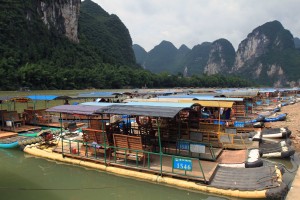
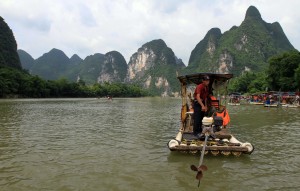
We reached the pier after about two hours from when we started off. On the way to the boat many old women were trying to sell us their goods and one in particular would not stop harassing me to try to buy some peanuts or little hand-carved wooden ducks. Finally, our tour guide split us up in to groups of four or five and we loaded on to our respective “bamboo rafts”. At one time in history the boats navigating the length of the Li River may have been made of bamboo, however, all the boats I saw had their bottoms made out of plastic tubes molded in the shape of bamboo; each craft did have a bamboo pole that was used for launching the boats off the pier.
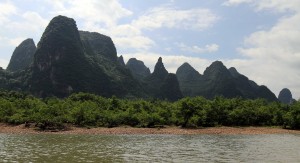
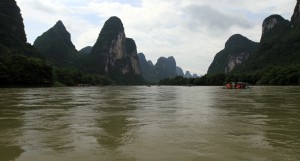
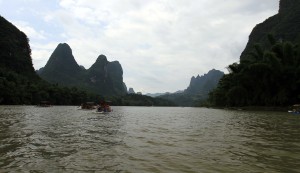
After getting situated and donning our life preserver vests, the skipper launched us off the dock and turned on the Yamaha motor. We were soon moving south on the river enjoying all the incredible natural features this land has to offer. Giant limestone peaks could be seen on each side of the river, each sharply rising out of the earth below; trees, bamboo, and bushes covered most of each peak and on some of them I could see caves or crevices where the limestone had been eroded away. Also, since we were moving swiftly on the river’s surface, a cool wind was hitting my skin, taking me away from the otherwise hot and humid weather, making the journey all the more pleasant.
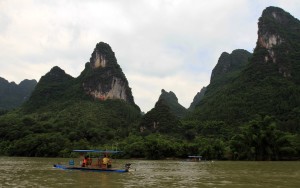
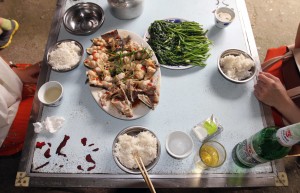
After less than a hour on the river, we pulled aside to the left bank to eat lunch. Two young ladies invited me to their table where they ordered swordfish, fish soup, and steamed vegetables with garlic – the menu was in Chinese and they spoke about five words in English; one of them used a language translation application on her phone to let me know what she had ordered. I then pointed to another table and made a drinking motion, she understood and ordered a beer for me. Once the food came to our table, she grabbed rice for all of us and we began to eat. The splayed swordfish was delicious with it’s soy sauce based marinade and I enjoyed the steamed vegetables as well. We finished up our lunch and split the bill three ways. We then got back in to our rafts and were soon moving down the river again.
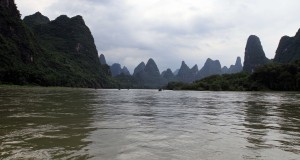
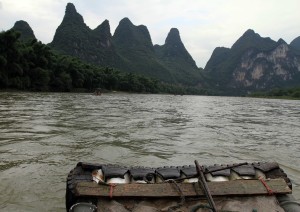
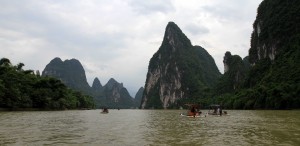
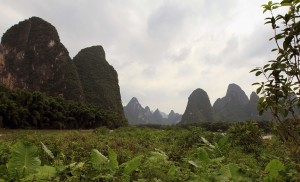
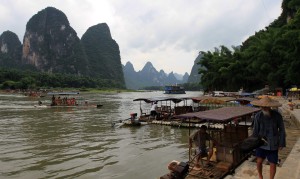
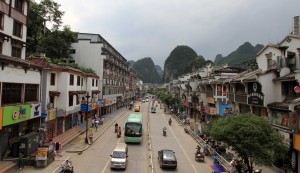
It wasn’t too much longer before we stopped again at a small island in the center of the river where cooked fish, honeycomb, trinkets, and cold drinks were being sold. Also, photographers were there to take your picture and give you a free two-inch photo in the hopes that you would then buy a key chain to put the photo in. After that stop, we got back into the boats to simply move to the Xingping Pier, which was located to the left of the island. This was the end of our “bamboo raft” part of the tour. We were loaded into three eleven-seater carts and taken to the parking lot where our bus would soon be. We then got back on to our bus and were driven to the city of Yangshou. This is where the tour for the two young ladies and I ended. I received directions on how to get to the North bus terminal with the help of a cellphone call back to the woman who works at the hostel I was staying at. The young lady with the language application on her phone used it to ask if I “could not stay one day in town to play” – I noticed at lunch that the application didn’t always deliver the most accurate translation and it would be impudent of me to assume she wanted to alleviate me of my concupiscence, but it didn’t matter, all my things were in Guilin and I had to get back there, though certainly a part of me wishes I had stayed one day in Yangshou to find out what she had in mind (guess which part). So, unfortunately, I said goodbye and walked through the town to the bus station. I found the correct bus to Guilin and shortly after I had gotten on, the bus filled up with passengers, and we were driving north. In a little over an hour we were in Guilin and I walked back to the hostel, showered, and relaxed for a while.
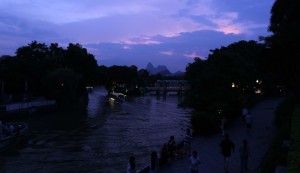
In the evening, I exited the hostel and walked north along Zhongshang Road looking for an inviting restaurant to satisfy my hunger, but alas, after walking up and down for an hour I could not decide on an adequate place to eat, so I went back to the hostel with a feeling of defeat. Along the way I stopped in a convenience store to see if any tantalizing sustenance was to be found there; I did not see anything that interested me, but I did see some odd food there, such as taro chips, dried whole fish, and bags of minced ants (I know insects are an excellent source of protein and once cooked with flavor added, they can be delicious, but I cannot imagine myself ever purchasing a bag of minced ants. For dinner I ordered kung-pao chicken and a Franziskaner Hefe-Weisse at the hostel; sadly, the meal lacked peppers and therefore any “pao” what so ever. As I finished my meal, a Londoner sat down next to me and played ‘Shutter Island’ on the television. Throughout the movie we discussed the different countries I was planning on traveling to and he offered much advice being a well traveled individual himself. After two more beers I eventually called it a night and slept a heavy sleep.
